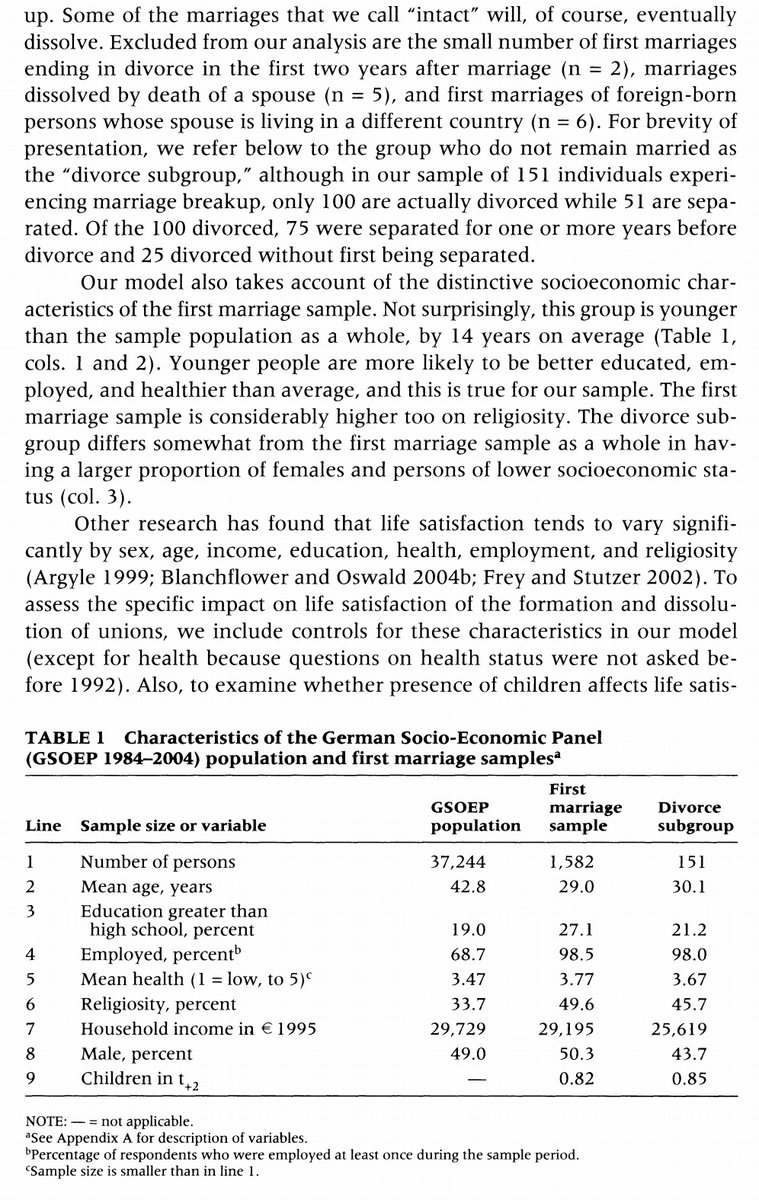1/ Does Living in California Make People Happy? A Focusing Illusion in Judgments of Life Satisfaction (Schkade, Kahneman)
"Self-reported overall life satisfaction was the same in both regions, though participants expected Californians to be happier."
web.mit.edu/curhan/www/doc…
"Self-reported overall life satisfaction was the same in both regions, though participants expected Californians to be happier."
web.mit.edu/curhan/www/doc…

2/ "When attention is drawn to the possibility of a change in any significant aspect of life, the perceived effect of this change on well-being is likely to be exaggerated.
"Paraplegics & lottery winners have many experiences that do not relate directly to their special status.
"Paraplegics & lottery winners have many experiences that do not relate directly to their special status.

3/ "Once the situation in which they find themselves is no longer novel, people in these circumstances often (perhaps mostly) think of other things.
"College students were asked two questions: "How happy are you?" and "How many dates did you have last month?"
"College students were asked two questions: "How happy are you?" and "How many dates did you have last month?"
4/ "The correlation was .12 when the happiness question came first but rose to .66 when the order was reversed. Focusing attention on dating is apparently sufficient to induce the illusion that this aspect of life dominates one's well-being. 

5/ "After correcting for demographic differences, there was no difference in self-reported overall life satisfaction between students in California and in the Midwest.
"This is remarkable, as satisfaction with several individual aspects had differences, all favoring California."
"This is remarkable, as satisfaction with several individual aspects had differences, all favoring California."

6/ "Self-reported overall life satisfaction was higher than what was predicted for a similar individual in another location.
"Although life satisfaction did not differ in the two regions, respondents in both regions predicted higher overall satisfaction for a Californian."

"Although life satisfaction did not differ in the two regions, respondents in both regions predicted higher overall satisfaction for a Californian."


7/ "Respondents who imagined life in another region correctly anticipated many of the differences in satisfaction with individual aspects of life - especially climate, but they failed to appreciate that these those do not loom large in people's overall evaluations of their lives.
8/ "Easily observable aspects of life that distinguish the two regions are therefore assigned too much weight when people imagine life in a different place.
"In Table 1, the two regions differ most in satisfaction with aspects of life rated as relatively unimportant."
"In Table 1, the two regions differ most in satisfaction with aspects of life rated as relatively unimportant."

9/ "Thinking of the life satisfaction of someone in a different region apparently increased the perceived importance of these distinctive aspects (e.g. climate, cultural opportunities) without decreasing the perceived importance of other aspects of life." 



10/ "When added to the model one at a time, four of the five climate-related aspects of life were successful as mediators (natural beauty was the exception), each separately rendering the region effect nonsignificant. Cultural opportunity was also an effective mediator." 

11/ "It is difficult to simultaneously allocate appropriate weights to considerations that are at the focus of attention and to those currently in the background.
"The focusing illusion may also entail an exaggeration of the importance of ideas that are currently on the agenda.
"The focusing illusion may also entail an exaggeration of the importance of ideas that are currently on the agenda.

12/ "A politician may leverage the focusing illusion by announcing small initiatives with great fanfare, encouraging the erroneous belief that these initiatives will make a substantial difference in people's lives.
"Nothing you focus on will make as much difference as you think.
"Nothing you focus on will make as much difference as you think.
13/ "A focusing illusion would lead people to exaggerate the adverse impact of climatic changes by underestimating the ability of future generations to adapt.
"People may exaggerate the future hedonic impact of such changes."
From Steve Koonin's book:
"People may exaggerate the future hedonic impact of such changes."
From Steve Koonin's book:
https://twitter.com/ReformedTrader/status/1448121610708393984
14/ Related reading:
Robust Beauty of Improper Linear Models in Decision-Making
Expert Political Judgment
If Money Doesn't Make You Happy, Then You Probably Aren't Spending It Right
Robust Beauty of Improper Linear Models in Decision-Making
https://twitter.com/ReformedTrader/status/1442724335123193859
Expert Political Judgment
https://twitter.com/ReformedTrader/status/1368022899131478018
If Money Doesn't Make You Happy, Then You Probably Aren't Spending It Right
https://twitter.com/ReformedTrader/status/1448828710908424195
• • •
Missing some Tweet in this thread? You can try to
force a refresh






















